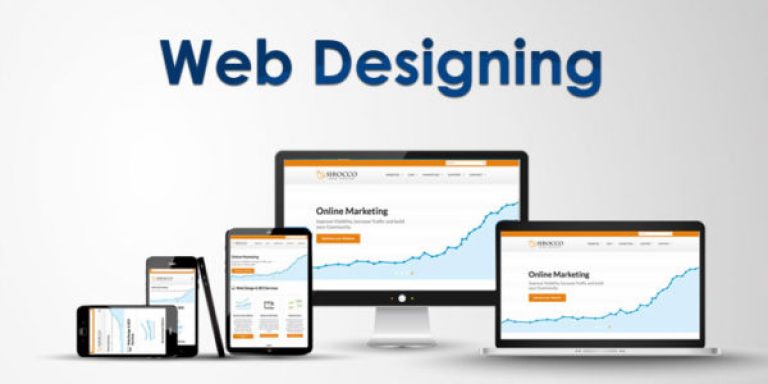No products in the cart.
Find out why you should engage a web designer for your next project.
Creating a website for your business is a huge deal. Your website will serve as an online shop for your business, allowing you to reach more clients. More than 66% of the world’s population, including 93.4% of Dubai, have an internet connection. A new website can provide numerous new chances, but this is dependent on how your website is designed.
The style of your website might indicate the legitimacy of your company. It can also influence whether users return or abandon your site the first chance they receive. If a customer has a negative experience on a website, 83 percent of them will do business with another company.
So you may be asking yourself, “Should I hire a web designer?” The answer to this question depends on a variety of factors, including the type of business you run and the amount of budget you have. However, a well-designed website may benefit almost any business. In this post, we will look at some of the reasons why you should engage a web designer, as well as some factors to consider during the process.
Why should I engage a website designer?
There are numerous reasons why hiring a web designer may be the best option for refreshing the look of your existing website or creating a whole new one. Before you explore another choice, think about the advantages of having a professional create your website.
1. Save time and money.
A significant advantage of hiring a web designer is that it saves you time. Web designers are experts who spend their days studying the most recent design trends and best practices, as well as how to use cutting-edge graphic design software. They will also have expertise in designing dozens, if not hundreds, of websites similar to yours. While you can try to get the same results by learning design and all of the tools, it will take considerably longer and produce results that are not comparable.
A competent web designer will also be effective in suggesting features for your website that you may not have considered but may require later on, saving you time.
2. customized design.
Businesses frequently use a content management system (CMS) to speed up the creation of their websites. A content management system (CMS) allows non-technical people to easily alter website material. Instead of employing a web designer, the firm can use one of the CMS’s templates and adapt it to their branding and demands.
The trouble is that many other firms will be doing the same thing, and your design will wind up looking similar to theirs, despite the adjustments that were made. Whether or not you utilize a CMS, a website designer will create a one-of-a-kind design that fits your business.
3. Customer Support
When you engage a web designer, you have someone you can contact to make changes to the design quickly and easily. If you customize a template yourself or have someone on your team do it, they will be pulled away from their regular duties to make the adjustments.
4. Professional appearance.
A web designer will design your website so that it is dynamic, functional, and visually appealing. Design standards and trends are constantly evolving. These improvements are typically the result of technological advancements that enable new features to improve the user experience. Hiring a web designer can ensure that your design does not appear outdated or like a cookie-cutter site that differs only marginally from other online sites.
5. Responsive Design
Visitors to your website may use a variety of devices to view it, and your single website design must appear nice in all formats. This requires a lot of work, knowledge of potential devices, and responsive design expertise.
Just because your site appears excellent in a regular web browser like Chrome does not imply that it will look good on an Android or iPhone. A web designer will ensure that your website identifies the device being used and applies the appropriate styles so that it always appears good.
6. Faster webpage.
Your website’s speed is vital not just for your visitors but also for its Google ranking. It is well known that reducing the amount of time it takes for your page to load can increase conversion rates, and Google also takes this into account when deciding where to rank your website in search results. A web designer will optimize the load time of your site so that visitors do not depart in search of a faster-loading competitor.
7. Increased potential traffic.
Website designers are familiar with search engine optimization (or SEO), which is the process of improving your website’s content and structure to achieve the highest possible ranking in search engines. One of the ranking elements that a website designer may assist you with is site speed. However, they may also optimize the structure and content of your site so that it appears better to search engines such as Google and generates more visitors.
8. Dependable
Hiring a web designer will simply make your website more reliable. If you try to create the design in-house or use a template, you never know if there is a flaw waiting for a customer to discover it or if the design will hold up once it begins to receive real traffic. A web designer will understand how to create a design that will not crash or include flaws.
What to consider when choosing a web designer
If you have decided to engage a web designer, that is simply the beginning. The next step is to find the correct one. Here are some pointers to help you pick a web designer who meets your objectives and ensures you can work with them efficiently.
Understand the goals for your website.
The appropriate web designer can create a design that meets all of your objectives and goals, but you must first determine what they are. Web designers are skilled at incorporating your message and brand into visual and interactive aspects, but they are not marketing or advertising specialists.
Before you approach a designer, you must first determine the goal of your website. Will it sell items and services, or will it be a content marketing site that offers information? What is your company’s culture, and how do you want it portrayed on the internet? Do you cater to an older or younger audience?
There are many more questions you may ask yourself, but the key is that you should not hunt for a designer until you know what you want the website to do.
Have your copy ready.
Knowing your website’s goals also includes having your copy ready. Unless you employ a full-service advertising agency to build the site, you must develop the copy yourself or pay a copywriter.
It should be your goal to hand over the website copy during your initial design meeting. It will help the designer get started quickly and provide greater direction because they can construct the site around the copy.
Examine some designer portfolios.
Before contacting the first designer, look through a few portfolios to avoid wasting time. Begin by asking your network who they would recommend. If that list is too short, try searching for web designers in your field. Many web designers specialize in creating websites for specific types of organizations, so they will be familiar with what your consumers or clients anticipate.
Once you’ve compiled a list of potential web designers, review their portfolios to determine what catches your eye and suits your needs. Any web designer worth employing will have a large portfolio, but not all will suit your needs. Once you have a few possibilities, schedule a meeting with each to decide who will design your new website.
Ask questions.
While interviewing web designers, you should ask a few questions to establish how much of the web development process they are familiar with. After all, web design is just one part of a great website.
- Who will be responsible for developing the website? Web designers create the visual aspects and user flow of a website, but a web developer is required to make those designs a reality. Many designers collaborate with website developers. Others do not; therefore, you will need to hire one as well.
- How will maintenance be handled? Websites are not one-time expenses. They require ongoing upkeep. Will your team manage this, or does the designer offer upkeep or can they recommend someone?
- Do you require licensing for any of the graphics? Some typefaces or graphics in your website design may require a license. It is your job to be on the right side of the law, so consult your site designer.
- What is the process for making revisions? Getting your design does not entitle you to the web designer’s services indefinitely. Find out how much it will cost you to modify the design in the future.
- Do you receive an editable copy of the design files? You’ll need these if you wish to update the design and the original web designer isn’t available.
Learn more about web design.
Your website’s design is a crucial component of your brand and the experience you deliver to your customers. Hiring a web designer ensures that you have a professional design that matches your brand, looks excellent on numerous devices, and can save you time and money.

